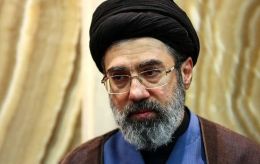On the brink of abyss: Will Iran build nuclear weapons and how to halt it
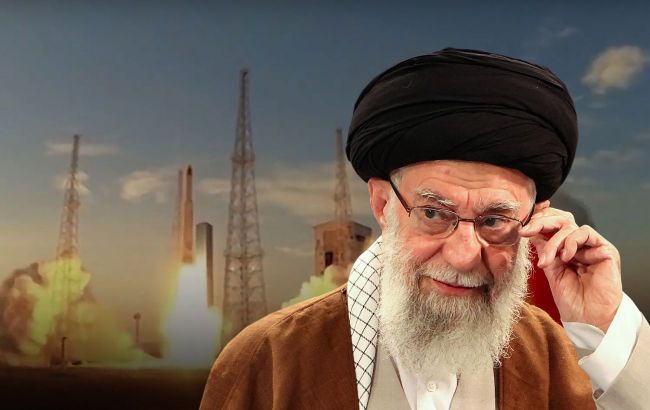 Iran's Supreme Leader Ali Khamenei and the launch of the rocket carriers (RBC-Ukraine collage)
Iran's Supreme Leader Ali Khamenei and the launch of the rocket carriers (RBC-Ukraine collage)
Western politicians claim that Iran is on the verge of developing its own nuclear weapons. More on what this could mean, what technologies Tehran possesses, how Russia factors in, and why Iran hasn't yet made nuclear weapons in the RBC-Ukraine coverage below.
Contents
- Technical aspect of the issue
- Political aspect – why Iran hasn't made the final step
- Russian factor and missile carriers
- What could happen if Iran builds nuclear weapons
Yesterday’s massive attack on Israel by Iran has escalated tensions in the Middle East to a new high. So far, Iran has only used conventional weapons. However, the possibility of Tehran developing nuclear arms is a frightening prospect.
Iran has long held the reputation of being one of the most aggressive nations in the Middle East. It has consistently attacked Israel through proxy organizations, interfered in the internal politics of Iraq, Lebanon, and Yemen, and supplied drones and ballistic missiles to Russia for use against Ukraine. But the challenges from Iran could become much more severe, as it is a country with nuclear technology.
US and UK officials are concerned that Russia is providing Iran with secret nuclear technology in exchange for weapons, as Tehran could soon initiate nuclear production, according to Bloomberg on September 15. The Biden administration remains deeply worried about Iran's nuclear activities.
On August 20, US Secretary of State Antony Blinken said that Tehran currently can begin producing nuclear weapons within one to two weeks.
Technical aspect of the issue
One or two weeks to create a nuclear weapon is overly optimistic. A more realistic estimate suggests that Iran could produce nuclear warheads within six months, according to Valeriia Gergiieva, an analyst at the Odesa Center for Non-Proliferation and Disarmament, in a comment to RBC-Ukraine. This conclusion is based on data available to the International Atomic Energy Agency (IAEA), which, despite certain restrictions, has partial access to Iran’s nuclear facilities.
While Iran remains a party to the Nuclear Non-Proliferation Treaty (NPT) with some caveats, much of what is known about its capabilities comes from the Joint Comprehensive Plan of Action (JCPOA), commonly referred to as the "nuclear deal."
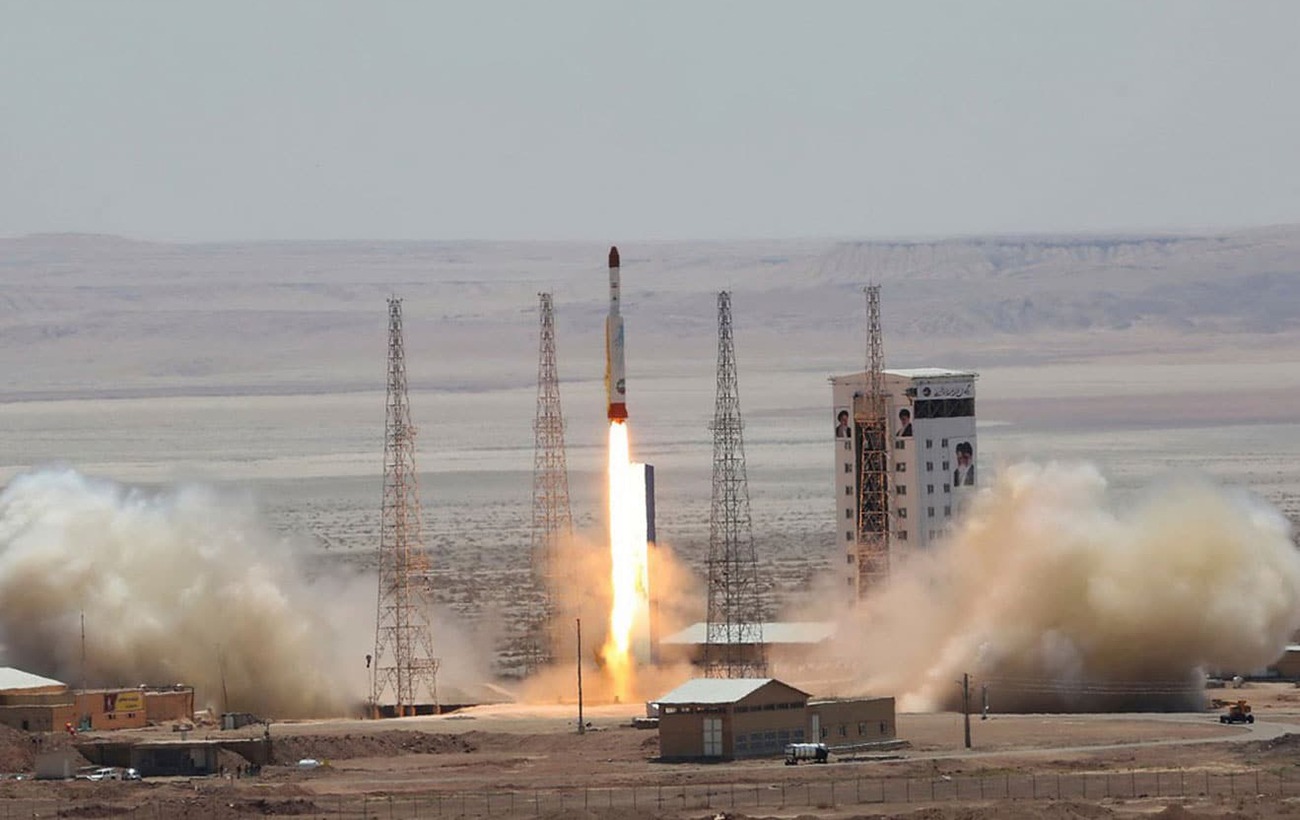
The launch of an Iranian rocket carrier (photo: CSIS)
In 2015, Tehran signed the JCPOA with the five permanent members of the UN Security Council and Germany. The deal lifted some economic sanctions on Iran in exchange for limits on its nuclear program. However, in 2018, then-US President Donald Trump withdrew the US from the agreement and reinstated financial sanctions on Iran.
"In 2015, when the JCPOA was signed, the IAEA had access to all Iranian nuclear sites. However, in 2018, inspections were paused but not entirely stopped. The IAEA still has partial access," says Valeriia Gergiieva.
From time to time, Iran limits access to its sites and dismantles surveillance cameras installed by the IAEA. However, in most cases, experts eventually gain access to the necessary facilities. Iran’s nuclear capabilities are well-known, and the amount of enriched uranium can be calculated. Therefore, if Iran were to try to hide materials to create nuclear warheads, it would be noticed.
As of August this year, the IAEA estimates that Iran has 5.7 tons of uranium-235, including 813.9 kg enriched to 20% and 164.7 kg enriched to 60%.
For nuclear weapons, uranium must be enriched further - at least to 90%. To make one tactical nuclear warhead, 25 kilograms of uranium-235 are needed.
However, the final enrichment to 90% could be done not at the large facilities known to the IAEA but at smaller, hidden ones. Additionally, it’s difficult to track when this process might start.
Political aspect – why Iran hasn't made the final step
For now, according to Western and Israeli intelligence, Iran has not started producing nuclear weapons. Moreover, at the UN General Assembly, Iranian President Masoud Pezeshkian stated that Iranians are ready to sit down with Europeans and Americans for dialogue and negotiations. He also claimed that Iran never supported Russian aggression against Ukraine.
There are different opinions regarding the effectiveness of efforts to curb Iran’s nuclear ambitions. Some experts believe that threats of new sanctions and other restrictions are quite effective.
John Erath, Senior Policy Director at the Center for Arms Control and Non-Proliferation (US), told RBC-Ukraine that Iran has chosen to continue its nuclear program in defiance of its international obligations under the NPT and the JCPOA. While it has not yet decided to create or test nuclear weapons, deterrence is somewhat effective.
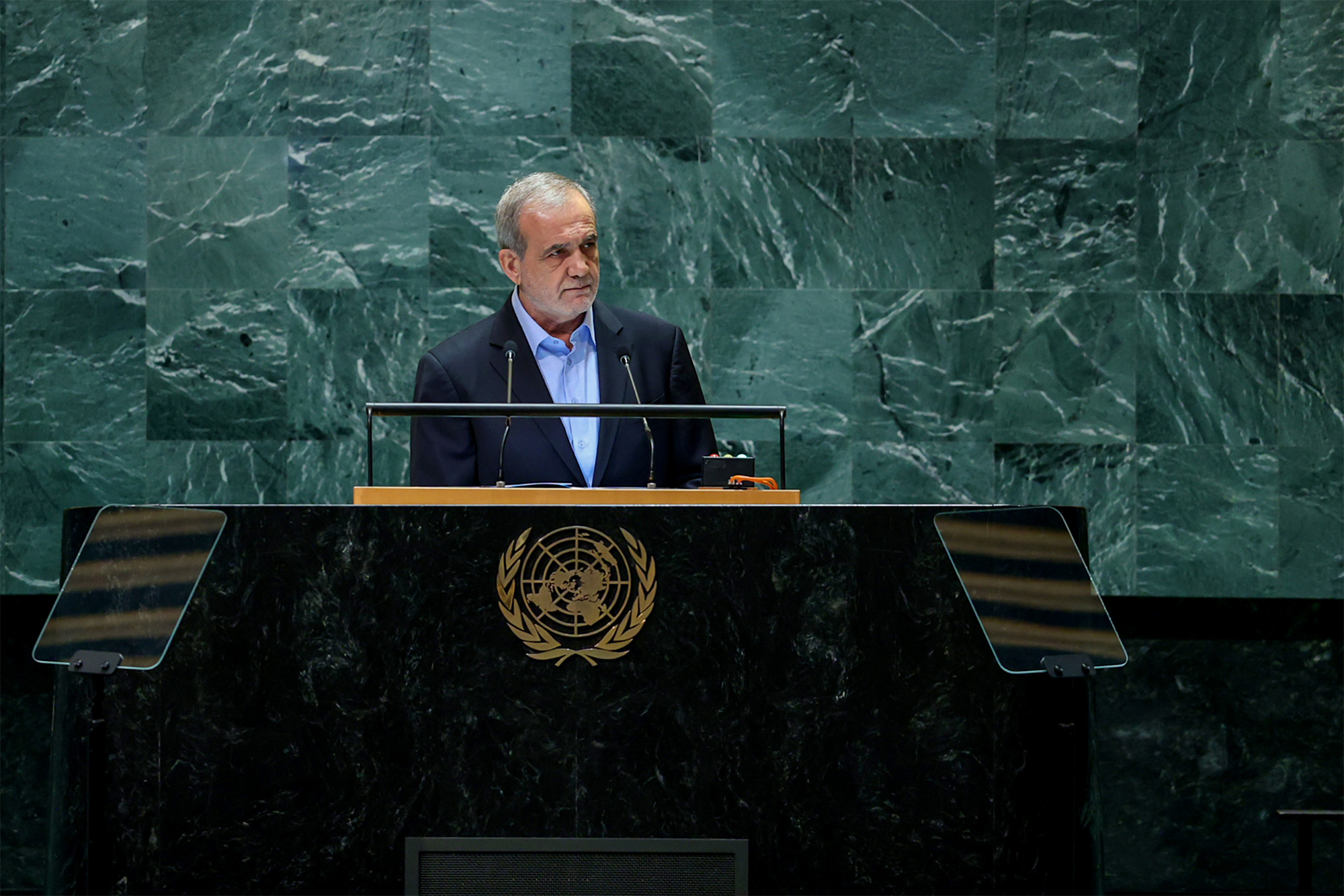
Iranian President Masoud Pezeshkian speaking at the UN General Assembly (photo: Getty Images)
At the same time, representatives of the Jewish Institute for National Security of America, Jonathan Ruhe and Yoni Tobin, in a column for The Cipher Brief, said that noticing the self-restraint of the US and the EU, Iranian officials are increasingly making more direct hints at their ability to create nuclear weapons if provoked immediately.
For example, in April this year, the commander of the Nuclear Security and Defense Corps, Sardar Haq Talab, stated that in the event of an Israeli attack on Iran's nuclear facilities, Iran could reconsider its nuclear doctrine and policies regarding nuclear weapons. However, this seems more like diplomatic posturing.
"This has been the Iranian doctrine for some time. The current restatement is intended to signal the seriousness with which Iran approaches the nuclear issue while leaving a path open to renewed talks," said John Erath to RBC-Ukraine.
According to Valeriia Gergiieva, it is currently beneficial for Iran to remain a "threshold" country, meaning one that could develop nuclear warheads at any moment but has not yet done so. This is connected to President Pesechkiyan’s statements about a willingness to resume negotiations.
Earlier, Iran threatened Israel with retaliation for the assassination of Hamas leader Ismail Haniyeh in its capital but has so far refrained from a direct attack.
"Iran seeks leadership in the region. If it is to sit down at the negotiating table with the US, it will only do so on equal terms. And nuclear weapons could provide that equality. This threshold status already gives Tehran a bit more assertiveness and confidence," Gergiieva explains.
There is, however, another perspective. Iranian oppositionist Vahid Beheshti, currently living in London, believes that Iran cannot take the final step toward nuclear weapons due to Israel's resistance.
"They would like to take that final step, but it hasn't happened yet because the Israelis, Mossad, are carrying out continuous targeted operations in Iran. They have excellent agents who do their jobs well," Beheshti told RBC-Ukraine.
Russian factor and missile carriers
Allying with Russia, as well as a less publicized one with China, only strengthens Iran’s position and provides resources for its nuclear program to eventually cross the threshold when necessary. According to Gergiieva, Iran possesses all the necessary technologies but requires resources, which it obtains through its cooperation with Russia.
"This provides Iran with the finances to support its economy and invest in its nuclear and missile programs. Previously, sanctions slowed Iran's nuclear program and allowed the US to keep Iran’s economy at a level where it could not actively develop these areas. Now, this is changing, and very quickly. Not only Russia but also China, has begun to work with Iran in terms of economic interests. This gives Tehran confidence," says Gergiieva.
Both regimes have intensified cooperation since Russia’s full-scale invasion of Ukraine, and this partnership is expected to formalize soon - a comprehensive strategic partnership agreement between the two countries is set to be signed at the BRICS summit in Kazan, Russia, on October 22-24.
Russia is also linked to another aspect that could pose a threat. According to Gergiieva, an important indicator that Iran is close to developing nuclear weapons would be the successful testing of an intercontinental ballistic missile. Currently, Tehran only has medium-range missiles, which are capable of reaching Israel or even Europe.
"If they have nuclear weapons, that's bad, but Iran currently cannot strike US territory. However, if they have delivery systems, then it's a double problem. Iran will be able to use nuclear weapons as a deterrent against a US attack. So, it would be better for them to first develop delivery systems and then the warhead itself," explains Gergiieva.
In this area, Iran is also making progress, particularly under the guise of developing a space program. Iran began developing its space program during the reign of the Shah, before the 1979 Islamic Revolution. Despite sanctions, the country has successfully launched its own satellites since 2009 and is even considering sending a human into space.
The most promising development in this regard is the two-stage Simorgh liquid-fueled rocket, which the Iranians describe as intended for placing satellites into low Earth orbit.
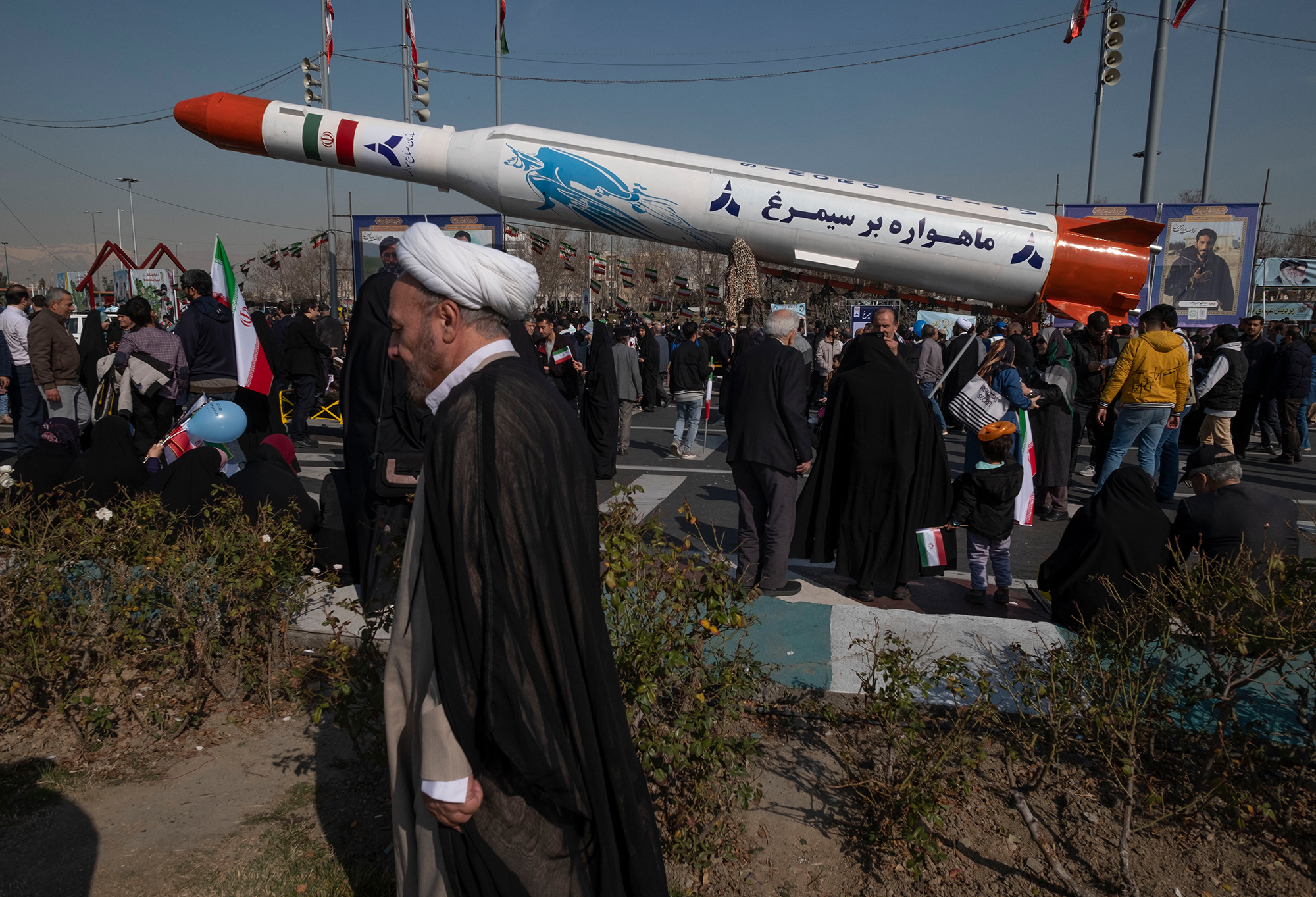
Public demonstration of the Simorgh missile launcher in Tehran (photo: Getty Images)
According to a US intelligence community report from February 2024, Iran’s work on space launch vehicles will shorten the timeline for the development of intercontinental ballistic missiles due to shared technology, as both use identical technologies. It is in the space sector where Russia has intensified its cooperation with Iran. Publicly, there is known collaboration on satellites and their launch from Russian territory, but this could also involve other technologies.
What could happen if Iran builds nuclear weapons
Iran’s acquisition of nuclear weapons could trigger the collapse of the non-proliferation regime and encourage other Middle Eastern countries to seek their own "nuclear umbrella."
"Iran does not have nuclear weapons yet, and it is difficult to speculate on what might happen should it take such a step. At a minimum, many countries would reexamine their security should a state sponsor of terrorism start to field weapons of mass destruction," says John Erath.
At the same time, Israel neither confirms nor denies having nuclear weapons. A nuclear Iran would present new challenges for Israel, likely prompting Jerusalem to rethink its position. Saudi Arabia, a long-time rival of Iran, has also expressed nuclear ambitions. This could create a situation reminiscent of Cold War nuclear deterrence between the US and the Soviet Union. Similarly, nuclear weapons have somewhat reduced tensions between India and Pakistan, or in the case of North Korea in the 21st century.
However, oppositionist Vahid Beheshti is convinced that nuclear weapons in the hands of Iran’s leadership would instead become a destabilizing factor.
"It’s a huge mistake to compare Iran to North Korea. The ideology and system of North Korea are completely different from the Iranian regime. North Korea has nuclear weapons to protect itself. But the ideology of the Iranian regime is to convert the entire world to Islam. If they gain access to even a few warheads, I have no doubt they will use them immediately. And the first state they will target is Israel," Beheshti said.
For now, John Erath believes it is essential to show the Iranian leadership that they would face far more problems than benefits from obtaining nuclear weapons.
"Iran must weigh the costs (greater international isolation, further sanctions, a possible regional arms race) against what illusory security it would gain from such weapons. Iran's collaborators, including Russia and China, must signal that nuclear weapons are unacceptable," said the expert.
Sources: reports from the IAEA, statements by American, European, and Iranian politicians, comments from Valeriia Gergiieva of the Odesa Center for Non-Proliferation and Disarmament, Senior Policy Director of the Arms Control and Non-Proliferation Center (US) John Erath, and Iranian oppositionist Vahid Beheshti.


